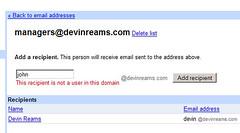I’ve figured it out: MySpace sucks becuase so many people are on it. Yet, there’s no underlying commonality that anyone shares. Well, except the fact they’re social, they’re bored, and they like to spend time online…
Facebook is about college students, parties, pictures, and hook-ups. Linked In is about professional connections, finding jobs, and building an online presence. 43 places/things/people is perfect because you find people based on the same interests/things/places. MySpace? People make profile’s becuase…um… everyone else already has?
This sucks because social circles overlap– nay, they collide. Children collide with creepy men. Stalkers collide with pretty women. Rapists and murderers collide with… well, each other (interestingly enough, MySpace was both the problem and the solution in this latest case).
Honestly, what little good has come from MySpace? Sure, you keep in touch with people you otherwise wouldn’t have. But can’t you can do that with email, instant messaging, photo sharing, etc? I already mentioned the ‘cons’ to this crappy site. What is it that keeps teens on it? What benefit out-weighs all the nonsese?
Oh, right: freedom. This article is a great analysis of why teens are hanging out in the “alley”.
By going virtual, digital technologies allow youth to (re)create private and public youth space while physically in controlled spaces. IM serves as a private space while MySpace provide a public component. Online, youth can build the environments that support youth socialization.
The internet is one of the only places the adults aren’t monitoring. Hah… well, they weren’t. As the groups collided people become very interested. I wonder how many parent’s are oblivious to their child’s internet activities…
On top of that, I think one big factor in MySpace’s popularity is the ability for MySpace to parallel the typical teenage social “values” (read: being anything other than a nerd).
The main reason nerds are unpopular is that they have other things to think about. Their attention is drawn to books or the natural world, not fashions and parties…
It’s true. Instead of focusing on school, learning, reading, playing, biking, hiking, etc., kids have become ever-so focused comments and friend counts. For example, “comments”, as mentioned in this article, are social dollars… and, in the case of MySpace, money does buy happiness. If you have a picture of yourself drinking, you’re cool. Do you have 927 friends? You’re very cool. I find this very sad. Who’s to blame? Adults and school (read Paul Graham’s article).
I wish some hackers (similar to ‘V’ from Vendetta) would figuratively blow up MySpace. Unfortunately, the’re too busy filling out ’50 question’ quizzes on their friend’s bulletin space…
References:
Danah Boyd. “Identity Production in a Networked Culture: Why Youth Heart MySpace.”
Paul Graham. “Why Nerds Are Unpopular.”
[tags]myspace, sucks, social networking, society, education[/tags]



